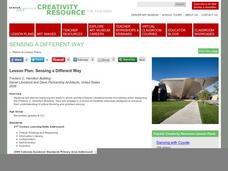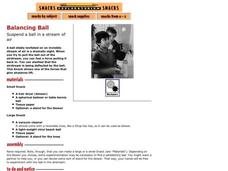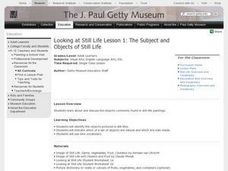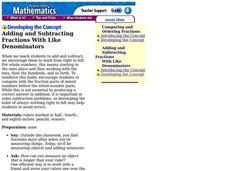Curated OER
Lesson: Sensing a Different Way
Problem solving and creative thinking are top priority in an interesting lesson. Learners explore how they can think creatively to use four common objects in three different ways, they discuss senses and using senses differently to...
Benjamin Franklin Tercentenary
Simple Machines, Ben Franklin and the Technology of the 1700s
Benjamin Franklin was an inventor, and he was fascinated by the mechanics of machinery. Using a fun exploration, pupils examine simple machines from the pre-Industrial era. Then, they must identify and build their own using common objects.
Physics Classroom
Polarization
Are your young physicists static-savvy? Test their skills using an engaging interactive from the Static Electricity series! Learners evaluate scenarios to determine how charges move between conductors and insulators, then identify...
Exploratorium
Balancing Ball
Demonstrate lift to the class that is studying aerodynamics. In the stream of air produced by a blow dryer, little physicists place a wad of tissue paper and a spherical figure to compare. Or, if you have a vacuum cleaner and beach ball,...
Curated OER
Surrealist Games
Students engage in a game of Exquisite Corpse. By looking at a painting by Ren?? Magritte and creating their own Surrealist "room," students further explore the Surrealist idea of placing common objects in unusual locations.
Curated OER
Sorting Objects
Students sort objects by color. For this classification lesson, students identify the color of the objects and categorize them according to color.
Curated OER
Visualize 3-D Objects and Make Nets of Common Solids
For this 3-D objects and common solids worksheet, students cut out and count the number of faces on several different types of boxes and make a cuboid from straws or a card. Students fill out 4 different categories involving 5 different...
Curated OER
Garden Scavenger Hunt
Second graders examine the metric system. In this metric system lesson, 2nd graders compare measurements of common objects in metric units. Students compete in a garden scavenger hunt.
Curated OER
Looking at Still Life Lesson 1: The Subject and Objects of Still
Students explore and discuss the objects commonly found in still-life paintings. They identify the objects pictured in still lifes indicating which objects are natural and which are man-made.
Curated OER
Music in the Common Schools
Students sing songs from the common schools era and compare music from the common schools era and today. In this music lesson plan, students look at pictures, fill out Venn Diagrams, and listen to music.
Curated OER
Classification
Young scholars investigate how different types of food can be classified then counted. In this sorting, arranging, and classifying lesson plan, students explore how to group foods based on commonalities. Young scholars are asked four...
Teach Engineering
What is a Nanometer?
Teams learn about the size of a nanometer by measuring objects and converting those measurements. A worksheet then tests the groups' abilities to use nanometers by having them determine the size of objects that are too small to...
Curated OER
Minerals Commonly Found in the Home
In this mineral worksheet, students collect 5 common household items that contain minerals and analyze them. After filling in a data table, students complete 3 short answer conclusion questions.
Curated OER
The Metric System
Learners practice converting metric measurements by completing the activities listed in this lesson plan. They first practice measuring common objects. They then convert metric measurements using the included worksheet.
Curated OER
Geometric Shapes: Everyday Objects
In this shapes worksheet, students analyze pictures of common objects. Students mark the geometric shape that each item is shaped like. Note: There is a misspelled word on the page.
College Board
2009 AP® Computer Science A Free-Response Questions
Coding and decoding is part of the work. Pupils and teachers use the released questions from 2009 to gather information on how topics show up on the AP Computer Science exam. The four questions range from the array data structure to...
Curated OER
Adding and Subtracting Fractions with Like Denominators
Young scholars add or subtract fraction parts of mixed numbers before adding or subtracting the whole number parts. In this fractions lesson, students learn to use a ruler to help them add and subtract fractions with like denominators.
Teach Engineering
Density Column Lab - Part 1
Mass and density — aren't they the same thing? This activity has groups use balance beams and water displacement to measure several objects. The pupils use the measurements to calculate the density of the objects.
Teach Engineering
Density Column Lab - Part 2
Groups suspend objects within layers of liquids to determine the densities of different liquids and compare them to the densities of objects calculated in Part 1. The groups then carefully test their calculations by layering the...
Teach Engineering
Scale Model Project
Try your hand at scale models. Scholars create a scale model of an object using a scale factor of their choice. As part of the project, they give presentations on their processes and calculations. This is the last installment of the...
Columbus City Schools
Transformation: Energy in Disguise
Energy transformations happen everywhere, every second of the day. The energy transformation common to most scholars is potential and kinetic energy. The three-week lesson covers multiple types of energy transformations through...
Curated OER
Addition and Subtraction of Fractions
Learners demonstrate how to solve addition and subtraction of fractions. In this fractions lesson, students use folded paper to shade in fractional parts and identify the sum of the parts shaded.
EngageNY
Solving Basic One-Variable Quadratic Equations
Help pupils to determine whether using square roots is the method of choice when solving quadratic equations by presenting a lesson that begins with a dropped object example and asks for a solution. This introduction to solving by...
Space Race
Sensory Detectives
Test your learners' sensory awareness with three hands-on activities that ask pupils to use their other senses to identify and describe everyday objects hidden from sight.























